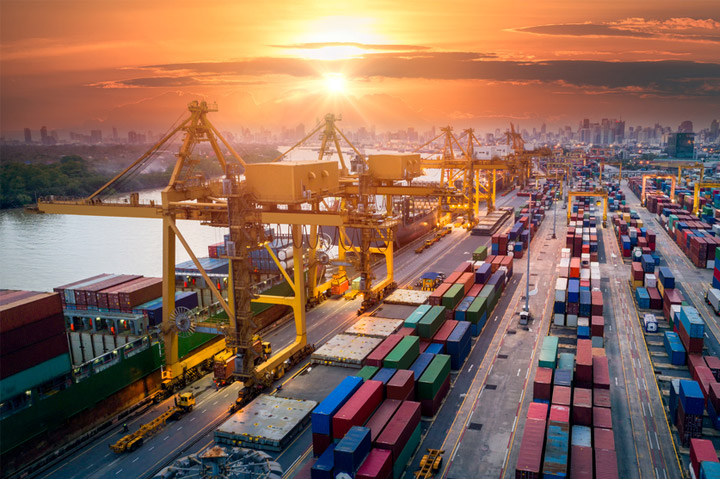News April 07, 2022
Shanghai COVID Shutdowns Threaten Supply Chains, Inventory
A lockdown in the large, important port city is exacerbating supply chain disruption, raising fears that inventory availability issues could intensify in the promo products market.
A massive COVID-driven lockdown of the key business and port city of Shanghai in China is starting to intensify disruption of global supply chains, threatening to exacerbate issues like inventory shortfalls in the North American promotional products market and other industries.
Authorities in China have pursued their long-standing “zero tolerance” policy on COVID by locking down Shanghai, a city of 26 million people that’s home to the world’s busiest container port. COVID has been surging in the city. A local daily record of 16,766 cases was reported Wednesday, April 6, as the highly transmissible omicron variant continued sweeping through. (As of this writing, there were reportedly more than 20 cities in China in some form of lockdown.)

Reports indicate that authorities have trashed plans to lift or ease restrictions in areas and the lockdown in Shanghai has been extended indefinitely – a reality that’s hampering the elaborate supply network of trucks, trains, factories, dock workers and ships that keep the huge quantities of export and import cargo moving in and out of the pivotal Port of Shanghai.
“The lockdowns have crippled manufacturing, warehousing, distribution and haulage services as people are forced to stay home,” Transmodal Corporation, a freight forwarder, said in a note to clients.
Suppliers in the promo products industry have already felt the ripple effects of China’s COVID upswing and restrictions.
“We’re experiencing factory closings, mill closings and elongated shipping schedules,” said Jeffrey Nanus, CEO/president of Norwood, NJ-based hard-goods supplier AAA Innovations (asi/30023). Freightos, a web-based freight booking provider, has said it currently takes an average of 80 to 90 days to transport goods by ship from Asia to the U.S. – roughly double the prior standard time.
COVID was on the rise in March in China, representing the worst outbreak there since the start of the pandemic in the city of Wuhan in 2020. The increase in cases, and related societal restrictions, cut into economic activity in China in March, with multiple surveys showing the nation’s vaunted manufacturing sector – which accounts for nearly 30% of global manufacturing output – going into contraction.
COVID cases and shutdowns are slowing down or shuttering production at some China factories, impacting supply chains.https://t.co/wsblSKduTk
— Chris Ruvo (@ChrisR_ASI) April 5, 2022
The Shanghai lockdowns only began on March 28, meaning their deepest effects on manufacturing and supply chain have likely not been felt yet.
“The possibility of major disruption to supply chains remains a large and growing risk,” Alex Holmes of Capital Economics told The Guardian. “The longer the current wave lasts, the greater the chance. An added risk factor is that after many months of disruption along their entire length, global supply chains are already very stretched. There is now a much greater potential for a small bottleneck to have large repercussions.”
Transmodal Corporation reported that cargo shipping through Shanghai will likely face disruption through at least mid-May. Port terminals are reportedly operating, but those operations have been negatively affected by labor shortages that have resulted from staff quarantining or staying home due to the lockdowns. There have been service cancellations and blank sailings, which refers to an ocean line operator canceling a call on or skipping a certain port, region or route. Cargo container supply may also thin out.
All that has potential to affect the flow of goods from China, where the majority of promotional products sold in North America are made. “It’s possible that it will have a further effect on inventory levels in our industry,” said Nanus, referring to the stock gaps that plagued promo in 2021 and that have been an issue to varying, often lesser extents, in 2022.
Shanghai's 25 million people under lockdown indefinitely. Chinese social media shows some breaking out of lockdown to protest, chanting: "we want freedom"; "why are you starving us?"
— Selina Wang (@selinawangtv) April 6, 2022
Much of the dissent is censored. Most of videos in our story were erased from the internet @cnn pic.twitter.com/QUHrfqEhiG
Still, Nanus and others note that the degree to which there could be inventory impacts is contingent on how long the lockdowns and related disruption to supply lines last. Having learned the lessons of importing during the pandemic, AAA Innovations and other suppliers, like Top 40 firm Koozie Group (asi/40480), have factored in potential upheaval like what’s going on in Shanghai and have brought more product stateside earlier than they would have in the past.
“This will be a minor disruption to us, as we have already padded our lead times and invested in deep inventory on our bestsellers in anticipation of blips like this in the supply chain for the foreseeable future,” said Pierre Montaubin, senior vice president of product management and sourcing at Clearwater, FL-based Koozie Group.
Even so, importers in promo and beyond that haven’t been as proactive in their inventory practices may be more subject to stock issues from the latest round of disruption.
A key takeaway for distributors is that they’ll continue to have to vigilantly check stock levels before pitching products. They’ll also need to persist with having alternative solutions at the ready if a top desired product is out of stock, and continue to proactively educate clients on supply line issues that can impact item availability.
Some in the sourcing world have sounded notes of optimism, noting that China’s sophisticated export networks will continue to get product out of the country and distributed to global markets, even if it’s at a less-efficient rate as certain ports and factories are affected for a time.
“The situation is tense, but the Chinese economy is resilient,” said Montaubin. “This hiccup is not going to halt exports.”
